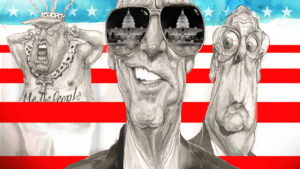Home » Commentary » Opinion » Can Biden really unite America? Probably not
· Financial Review
 The day of the presidential inauguration is when an American president must rise above the deep divisions of politics and reach to the higher duty of representing the nation. Joe Biden made that leap today with an authentic, heartfelt speech calling for repair and renewal.
The day of the presidential inauguration is when an American president must rise above the deep divisions of politics and reach to the higher duty of representing the nation. Joe Biden made that leap today with an authentic, heartfelt speech calling for repair and renewal.
Every president faces their own particular set of challenges, but the 78-year-old veteran senator and former vice-president was right when he said: “Few periods in our nation’s history have been more challenging or difficult than the one we’re in now.”
Indeed, the challenges are daunting: a pandemic that has killed more than 400,000 Americans, the greatest economic crisis since the Great Depression and widespread racial and cultural tensions. Add to this what Biden cited as environmental “survival” and “a rise in political extremism, white supremacy [and] domestic terrorism”. and it’s no wonder he repeatedly called for “unity”.
But can Biden — or anyone else for that matter — really bring the American people together? Can he restore their faith in their future?
Alas, there is every reason to think not. Usually renowned for its optimism, America is now consumed by self-doubt and a cultural crisis that stems from expectations about the country’s future that no president is likely to meet.
For generations, Americans have seen their nation as “a city upon a hill” (John Winthrop) and “the last best hope of Earth” (Abraham Lincoln) that would make the world “safe for democracy” (Woodrow Wilson).
The same vision is echoed in the idea of the American Century, which shaped the public consciousness after World War II. The collapse of the Soviet empire and the end of the Cold War three decades ago represented the “end of history” or the triumph of America’s democratic mission.
However, several setbacks in recent times have helped shatter American confidence. Think of the post-9/11 endless wars of the Middle East, the great recession of 2008-09, the various political scandals, the mounting trade and budget deficits, the technological disruption that has displaced many working-class Americans, the intense polarisation that produces government dysfunction, and so on.
A significant segment of voters doesn’t accept the new president’s election legitimacy. Many people no longer believe in the American dream.
Only a generation ago, America was rightly famed throughout the world for its democratic idealism. But during the past two decades, American public life has undergone a terrible deterioration.
There is a widespread consensus that things are badly off track. And the nation’s hyper-partisan atmosphere — fuelled by social media, the madness of student bigotry (rising intolerance of contrarian views on college campuses) and a cable news arms race of inflammatory rhetoric — makes matters worse.
Of course, America has undergone serious crises before — from the Civil War of the 1860s to the upheavals over Vietnam in the 1960s. Each time, it bounced back with tremendous force. However, at this stage, it is far from clear how this crisis of confidence will be reversed.
It is not just that public trust in politics has been declining for decades. Public confidence in virtually every major American institution — from religion and the courts to media and the military — has fallen.
A significant segment of voters doesn’t accept the new president’s election legitimacy. Many people no longer believe in the American dream.
American decline is the spectre that haunts US politics, and it helps explain why Donald Trump won power four years ago and why Bernie Sanders emerged as a major figure in Democratic presidential primaries. Neither extreme would have had such influence in their parties in earlier periods.
In fairness, it should be stressed that America possesses enormous strengths. After all, the greenback remains the world’s reserve currency, the Ivy League universities remain global intellectual trendsetters, the US remains militarily the most powerful nation in the world (though China is catching up) and, thanks primarily to shale gas fracking, the US is energy independent for the first time since the oil crisis of the 1970s. With vaccines rolling out, the US economy will soar once the pandemic passes.
All true. However, unless policymakers and politicians find ways to fix the political system and make government work better, Americans are likely to remain deeply divided and frighteningly polarised.
If this sounds anti-American, it isn’t meant to be. I sincerely hope the US can manage these challenges and recover from this crisis.
But for the first time in a long time, there is the uneasy feeling that America’s future is not as settled as it once appeared, and Biden will struggle to live up to this week’s lofty themes of unity and healing. Few modern presidents do.
Can Biden really unite America? Probably not